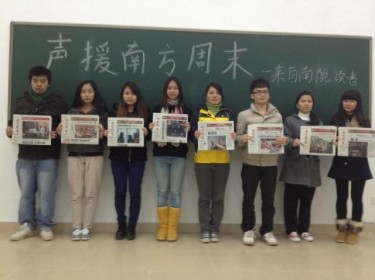Rare protests in China against press censorship are spreading online and offline. The protests were triggered after an editorial of the newspaper Southern Weekend (also known as Southern Weekly) was censored and re-written by a provincial propaganda department.
The censorship incident
Southern Weekend's 2013 New Year editorial, “China's dream, the dream of constitutionalism” was re-written under pressure from Tuo Zhen, the chief of the Guangdong Propaganda department. The new editorial, titled “Dreams are our promise of what ought to be done” was published on January 2, 2013. The intervention resulted in collective action from journalists and staff in the newsroom. They demanded an open investigation.

A group of journalism students in China expressed their support for Southern Weekend. Image from inmediahk.net (CC-NC)
On January 7, the propaganda department forced the newspaper's top management to seize Southern Weekend's official Weibo account and issue a misleading statement saying that the New Year's editorial was actually the collective work of the editorial team and the special topic teams. In reaction, about 100 staff members from Southern Weekend issued a joint statement and the economic news desk announced a strike.
Propaganda department retaliates
Soon, an instruction notice to all the media outlets from China's propaganda authorities was leaked. The notice stressed:
- Party control of the media is an unshakable basic principle;
- The incident has nothing to do with Guangdong Propaganda Department Head Tuo Zhen;
- The escalation of the incident is related to meddling by external hostile forces.
Defiance spreads
All online and print media outlets in China were ordered to reprint a Global Times editorial on January 8, which echoed the three points from the leaked instruction notice. Two newspapers, Beijing News and Xiangnan Morning Herald, refused the order. At this point, the Central Propaganda Chief stepped in and demanded they print the editorial the next day. In response, the publisher of Beijing News, Dai Zigeng, resigned.
Press censorship protests have spread online and offline. Citizen from Guangzhou gathered outside the headquarters of Southern Weekend on January 7, to express their support.
Readers, students of journalism and communications, media workers and different civic groups from inside and outside China have been collecting signatures, raising awareness, posting support messages and protest photos all over the Chinese online world to counter mainland China's censor machine.
Our Coverage
9 Jan – China's Propaganda Department Threatens to Dissolve Beijing News
8 Jan – China Blames “Foreign Forces” for Press Freedom Protests
8 Jan – Censorship Meets Rare Defiance as Journalists Strike in China
7 Jan – China: Sina Weibo Manager Discloses Internal Censorship Practices (on GV Advocacy)
4 Jan – Chinese Journalists Demand Resignation of Provincial Propaganda Chief
Resources
- Media Censorship in China – Council on Foreign Relations Backgrounder
- Censorship in China – Wikipedia
- Internet Censorship in China – New York Times Backgrounder
Twitter Hashtags: #SouthernWeekly | #SouthernWeekend
Tweets about ” #SouthernWeekly “
Please contact Global Voices Northeast Asia Editor Oiwan Lam if you have links or story ideas, or want to add to this page's resource list.
